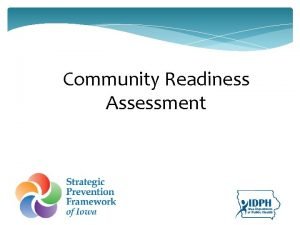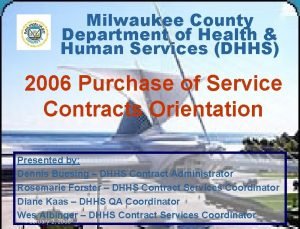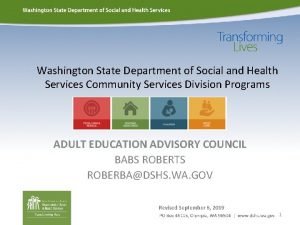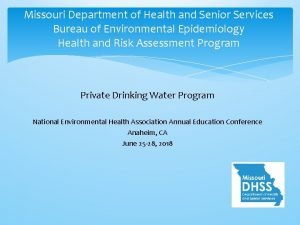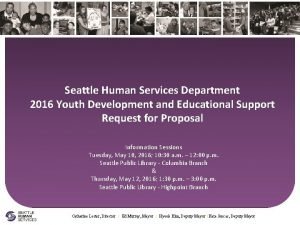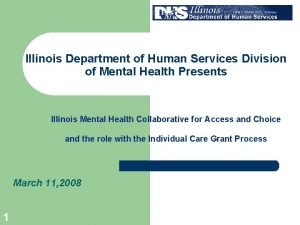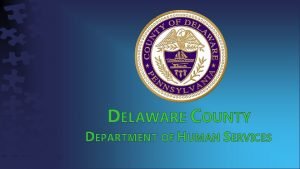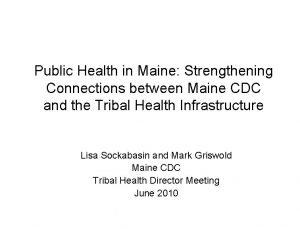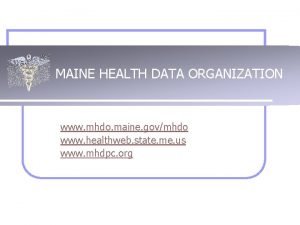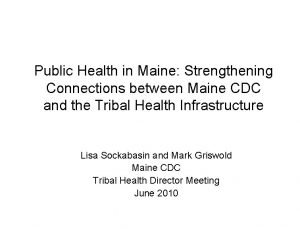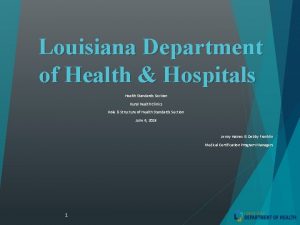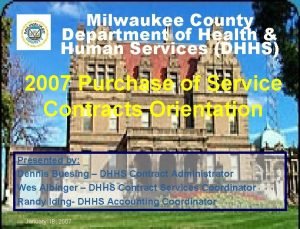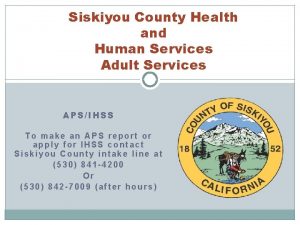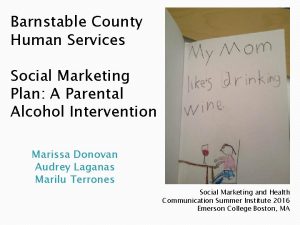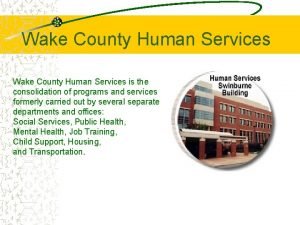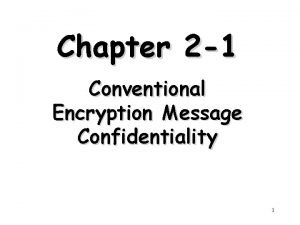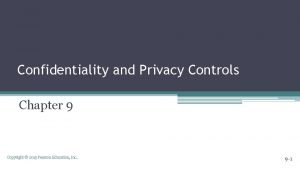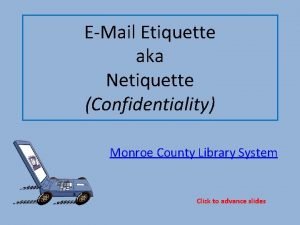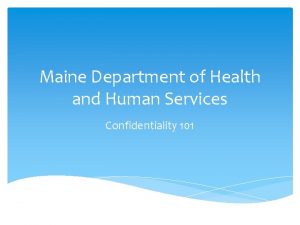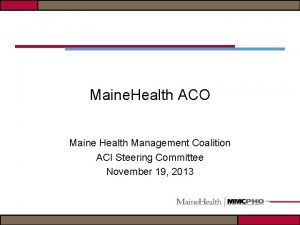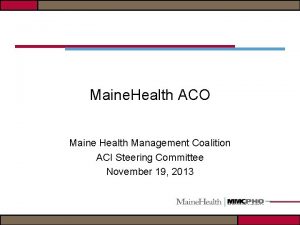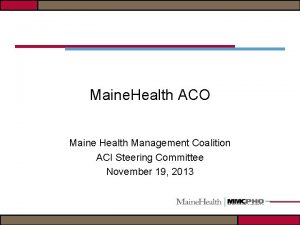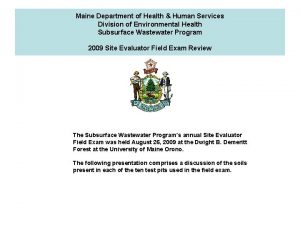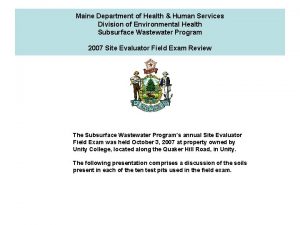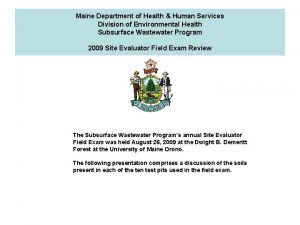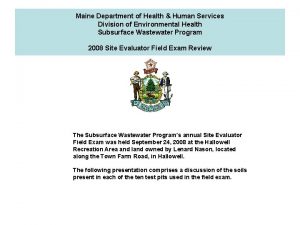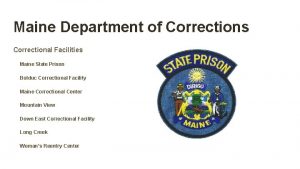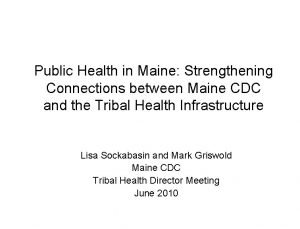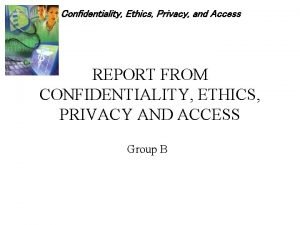Maine Department of Health and Human Services Confidentiality



















- Slides: 19

Maine Department of Health and Human Services Confidentiality 101

Welcome to the Maine Department of Health and Human Services Confidentiality 101 awareness training. This brief education session will provide a general overview of how we use and protect our consumer records here at the Department.

Why is Confidentiality Important? Receiving and protecting information is a privilege It is our privilege to assist the people of the State of Maine by providing a variety of benefits and services. Stewardship In receiving consumer information, we become responsible for protecting that information. Promise of confidentiality We must promise to keep that information confidential, just as we would want our own personal information kept private and secure.

Confidentiality is Important We keep an individual’s information confidential because: It is the right thing to do; Many laws, rules, regulations and accreditation standards require us to do so; It is a condition of our employment.

One Big Department? Back in 2004, when the old Department of Behavioral and Developmental Services (BDS) and the old Department of Human Services (DHS) were merged, many people thought the barriers to sharing information would go away. However, the statutes and regulations that define the “boundaries” around certain types of confidential information did not change.

“Boundaries” Each country has boundaries that define its territory and has numerous laws that apply to those within those boundaries. Each state in the U. S. has unique laws as well. You may notice, for example, that speed limits may vary as you drive across state lines. Similarly, each office, facility or program at the Department has confidentiality laws that apply to its consumer information and act as a boundary. Each program requires compliance with its “local” requirements” You may generally share consumer information within your program for work purposes, but may not share information outside of your program without proper permission.

Boundaries, continued Each office within the Department is separate from the other, and the identifiable information within each office is separate as well. Access to information depends upon the specific role of each office, program and member of our workforce. CDC OCFS OFI OMS OADS Riverview SAMHS Dorothea Dix

Boundaries, continued Statutes and regulations usually draw the outer boundaries around the program or office responsible for protecting confidential information. The boundaries might surround a program office (e. g. , the Office of Child and Family Services), or a smaller unit inside a program office (e. g. , the Adult Protective Services unit within OADS).

Borders, continued However the boundaries are defined, your job description and the law govern how and whether you can share information outside your facility, office or program. If you don’t know whether or with whom you are able to share consumer information, ask your supervisor.

Permission = Authorization You may only share confidential information with someone outside your program when you have proper permission, such as an authorization.

Minimum Necessary Local laws keep information secure. Inside your program, there are “local laws” for keeping information safe and secure. Use the “minimum necessary” to accomplish your job tasks. “Local laws” require that you use only the “minimum necessary” information to accomplish your work.

Need to Know Only access information that you “need to know” for your work. Although you may have access to certain types of information to accomplish your job tasks, you should only access, use or disclose that specific information that you actually “need to know” for your work. Do NOT access information that is not required by your job. If you do not need certain specific information to accomplish your job, then you should NOT look at that specific information; for example, do NOT look in a file folder for a case that is not assigned to you.

HIPAA IDENTIFIERS HIPAA Identifiers include: name street address, city, county, precinct, zip code, and any other geographic subdivisions smaller than a state dates (except year by itself) directly related to an individual, including birth date, admission date, discharge date, date of death Telephone or fax number email address social security number medical record number account numbers certificate or license numbers vehicle identifiers, including license plate numbers and serial numbers Facial photographs Biometric identifier (like a thumb print) Certain genetic information Maine law additions

What Information Is Protected? Depending on your office, you may have different or additional laws or requirements that govern. There are special rules around child and adult protective information, substance use disorder program information, HIV status information and more.

Best Practices Use best practices to keep information confidential and secure. Comply with DHHS confidentiality policies regarding the protection of consumer information. When unsure, ask for guidance.

Knowledge Check: True or False? All employees of the Maine Department of Health and Human Services may exchange consumer information freely. False Each Department program has its own confidentiality rules. Employees may only access, use or disclose the information that pertains to the work of their program and the role of that employee.

Knowledge Check: True or False? A license plate number is considered a HIPAA identifier. True It is included under “vehicle identifier and serial number” as one of 18 identifiers under HIPAA, along with name, address, account numbers, social security and credit card numbers, email addresses, and more.

Knowledge Check: True or False? Keeping consumer information confidential is a requirement for keeping our jobs at the Department. True We are required by state and federal laws, regulations and rules, as well as Department policy, to keep consumer information private and secure. Failure to do so may result in application of our Privacy and Security Sanction policy

Completion form Get Credit Please click on the above link to submit a completion form and get credit for reviewing this program
 Maine department of health and human services
Maine department of health and human services Iowa department of health and human services
Iowa department of health and human services Milwaukee county department of health and human services
Milwaukee county department of health and human services Oviposition
Oviposition Washington state department of social and health services
Washington state department of social and health services Department of health and senior services missouri
Department of health and senior services missouri Seattle human services department
Seattle human services department Illinois mental health collaborative
Illinois mental health collaborative Delaware county human services
Delaware county human services Maine dhhs districts
Maine dhhs districts Maine health data organization
Maine health data organization Maine public health districts
Maine public health districts West calcasieu cameron 3767 baton rouge la 70821
West calcasieu cameron 3767 baton rouge la 70821 Dhhs
Dhhs Siskiyou county ihss
Siskiyou county ihss Barnstable county human services
Barnstable county human services Wake county human services community services center
Wake county human services community services center Conventional encryption and message confidentiality
Conventional encryption and message confidentiality Confidentiality and privacy controls
Confidentiality and privacy controls Netiquette of confidentiality
Netiquette of confidentiality

